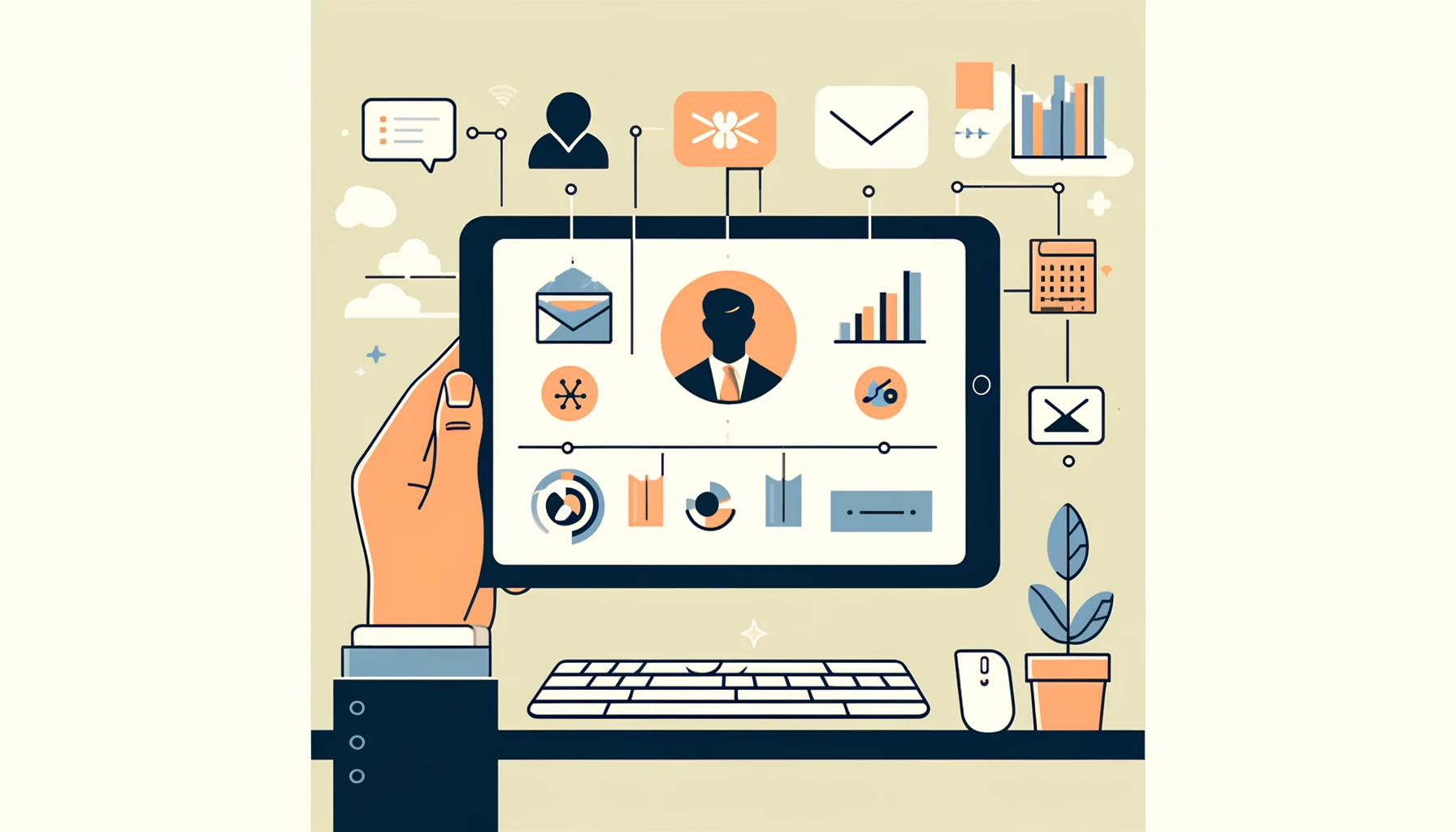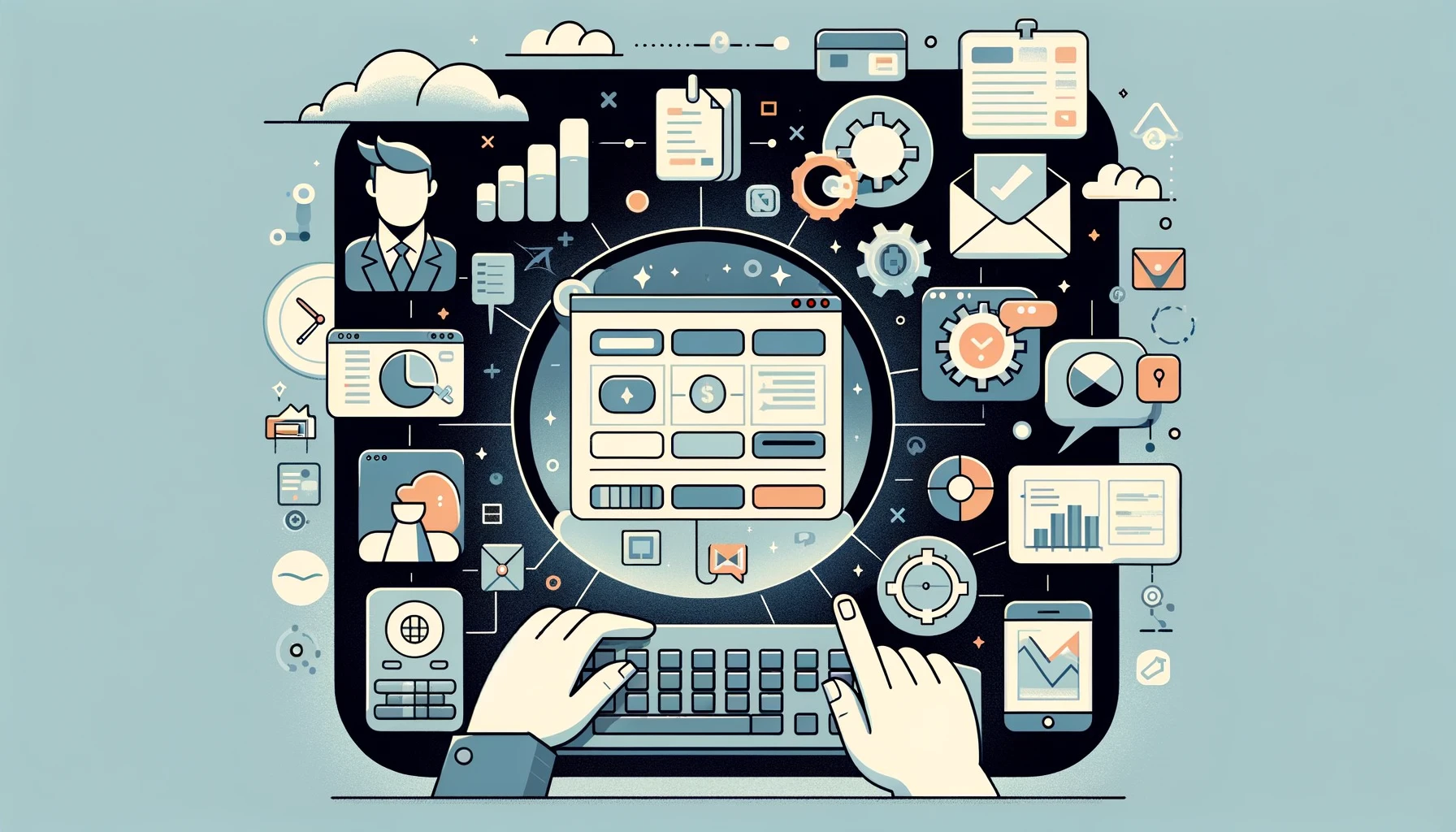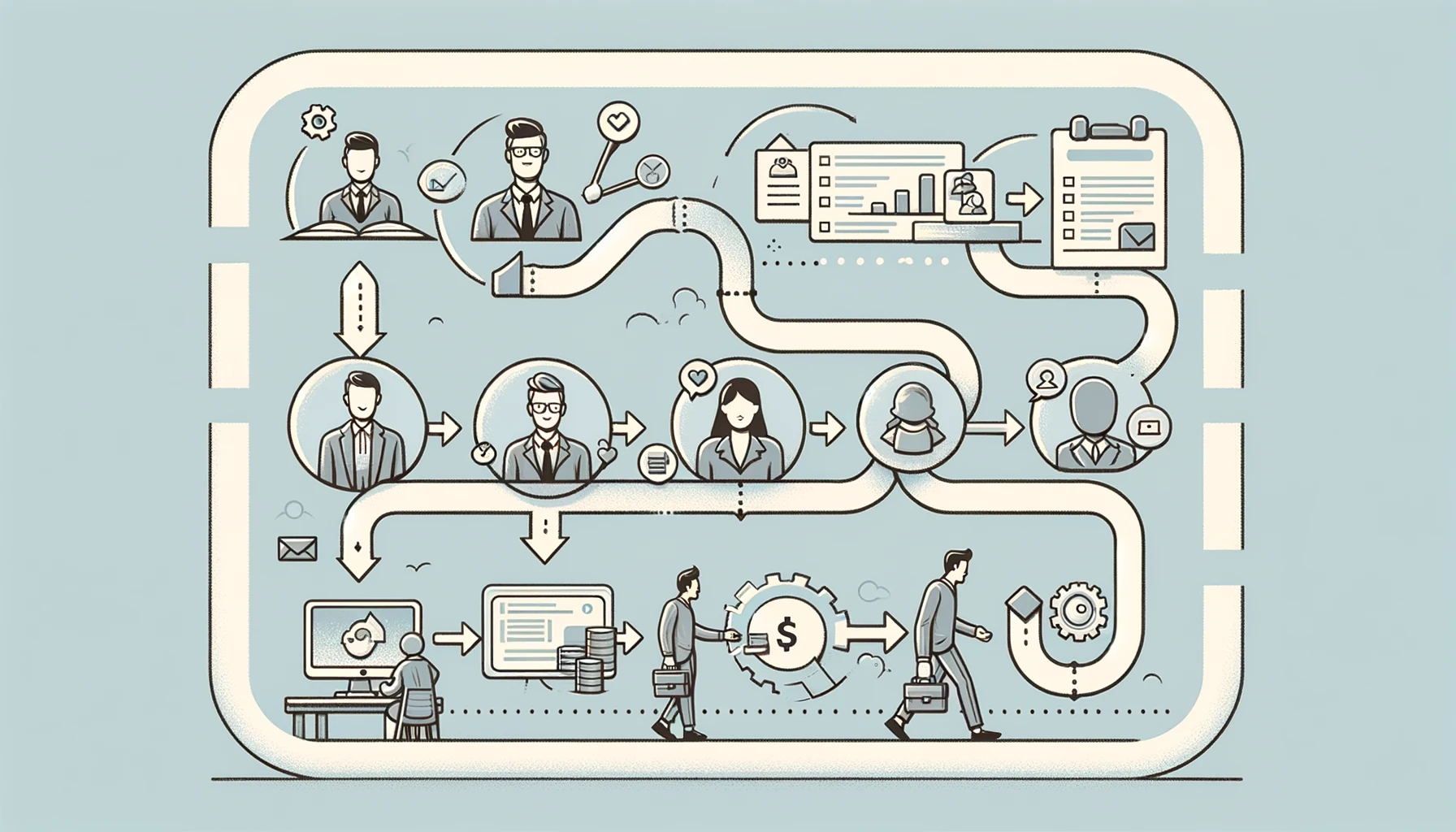CRM for Accountants: Streamline Your Practice

Discover how CRM for accountants enhances client relations and boosts efficiency. Ideal for accounting firms seeking growth.
Maximizing Efficiency in Accounting Practices
In the world of finance, efficiency is not just a buzzword – it’s the bedrock of a successful accounting practice. For accountants, leveraging a CRM is akin to having a superpower that streamlines client management and boosts operational efficiency. By centralizing client information, CRM for accountants becomes an essential tool that saves time and reduces errors, allowing you to focus on what you do best: providing top-notch financial services.
Imagine having all your client interactions, documents, and financial histories at your fingertips. With a CRM, you can automate routine tasks such as appointment scheduling, invoice reminders, and follow-ups. This automation not only frees up valuable time but also minimizes the risk of human error, ensuring a more reliable and consistent service.
Let’s delve into the tangible benefits of CRM systems with an easy-to-understand comparison:
| Benefits of CRM for Accountants | Impact on Practice |
|---|---|
| Centralized Client Information | Increased accessibility |
| Automated Task Management | Enhanced productivity |
| Streamlined Communication | Improved client satisfaction |
| Detailed Reporting and Analytics | Informed decision-making |
| Secure Document Handling | Better compliance and security |
These improvements can lead to a significant uptick in your practice’s performance metrics. For instance, consider the following before and after scenario:
| Metric | Before CRM | After CRM | Improvement |
|---|---|---|---|
| Client Response Time (hours) | 48 |
4 |
-91.7% |
| Document Retrieval Time (minutes) | 30 |
5 |
-83.3% |
| Monthly Client Retention Rate (%) | 85 |
95 |
+11.8% |
By implementing CRM, you’ll not only see a surge in productivity but also an increase in client satisfaction and retention – key markers of a thriving accounting firm.

As an expert in CRM for accountants, I can tell you that the adoption of such a system is not just a strategic move, it’s a transformative one. When your practice can anticipate client needs and respond to them swiftly, you build a reputation for excellence and reliability.
Remember, in the competitive field of accounting, it’s not just about the numbers; it’s about how effectively you manage your relationships and resources. A CRM tailored for accountants is your ally in achieving just that.
The Role of Specialized Systems in Client Management
In the intricate dance of client management, accountants must lead with precision and grace. Specialized CRM systems are the music that guides this dance, offering a rhythm to which every step is meticulously choreographed. These systems are not just tools; they are the backbone of client relationship management in modern accounting firms.
When you harness the power of a specialized CRM for accountants, you’re not just organizing contact details; you’re crafting a narrative for each client relationship. Each piece of data tells a story of past interactions, current projects, and future opportunities. This narrative is crucial for accountants who thrive on delivering personalized advice and services.
Here are a few key features that specialized CRM systems offer to enhance client management:
- Integration with Accounting Software: Syncing with tools like QuickBooks or Xero for seamless data flow.
- Customizable Workflows: Tailored processes that align with your firm’s unique practices.
- Client Portal Access: Secure platforms where clients can view their financial data and collaborate with you directly.
Let’s compare how specialized CRM systems stack up against generic ones:
| Feature | Specialized CRM | Generic CRM |
|---|---|---|
| Industry-specific Compliance Tools | ✓ | x |
| Direct Integration with Accounting Software | ✓ | x |
| Custom Financial Reporting Features | ✓ | x |

Incorporating a CRM that’s designed with accountants in mind means you’re not just meeting expectations; you’re exceeding them. You can pivot from reactive to proactive, from generalist to specialist. It’s the difference between a one-size-fits-all solution and one that fits like a glove – designed to handle the nuances of financial management with the finesse that your clients deserve.
By choosing a CRM built for accountants, you’re ensuring that your firm stays ahead of the curve, ready to adapt to the ever-evolving landscape of client needs and regulatory changes. It’s more than a digital tool; it’s a strategic partner that empowers you to provide exceptional service, every time.
Enhancing Client Interactions for Financial Professionals
In the meticulous world of accounting, enhancing client interactions is not just about delivering financial reports; it’s about fostering trust and building long-term relationships. CRM for accountants plays a pivotal role in this regard, serving as a bridge between data management and exceptional client service. It’s the key to unlocking personalized interactions that cater to the unique needs of each client.
One of the most significant advantages of a CRM is its ability to provide a 360-degree view of client interactions. This comprehensive perspective allows you to:
- Anticipate client inquiries with historical data
- Offer tailored advice based on past behavior
- Recognize opportunities for additional services
Let’s look at how CRM systems enhance specific areas of client interaction:
| Client Interaction Aspect | Enhancement with CRM |
|---|---|
| Personalized Communication | Tailored messages based on client data |
| Efficient Issue Resolution | Faster access to client history for quicker problem-solving |
| Proactive Service Offering | Identifying cross-selling and upselling opportunities |
By strategically utilizing CRM tools, your firm can transform the client experience. Imagine sending automated, yet personalized, tax reminders or offering insights into potential tax savings based on real-time data analysis. These touches not only save time but also demonstrate a level of care and attention that clients appreciate.
Moreover, a CRM can help streamline client onboarding, a critical first step in any professional relationship. By automating data collection and entry, you ensure accuracy and speed, setting the tone for a professional and efficient partnership.
Here’s how a CRM impacts the onboarding process:
| Onboarding Step | Impact of CRM |
|---|---|
| Collecting Client Data | Simplified through online forms and integration |
| Creating Client Profiles | Automated, ensuring no detail is overlooked |
| Initial Communication | Personalized and timely, thanks to automated workflows |

By enhancing client interactions at every touchpoint, from initial contact to ongoing services, CRM for accountants ensures that your firm stands out in a crowded market. It’s not just about managing data; it’s about enriching the client experience and paving the way for sustainable growth and success.
In summary, implementing a CRM system in your accounting practice is a game-changer. It allows you to provide personalized, proactive service that will not only retain clients but also attract new ones. With the right CRM, your firm can achieve operational excellence and a competitive edge in client satisfaction.
Streamlining Your Workflow with the Right Tools
In the dynamic field of accounting, possessing the right tools is crucial for streamlining workflow and enhancing productivity. A CRM for accountants is one such indispensable tool. It’s designed to declutter your workspace, automate mundane tasks, and ensure you have more time to focus on strategic client interactions. When workflows are streamlined, error margins shrink, client satisfaction rises, and your practice grows.
Choosing the right CRM system is pivotal. It should not only align with your current processes but also scale with your firm’s growth. Here’s a checklist to guide your selection:
- Ease of Use: The system should have an intuitive interface for quick adoption.
- Customization: It must offer customizable features to fit your specific accounting workflows.
- Integration: Look for seamless integration with existing accounting software and tools.
- Security: Strong data protection measures are non-negotiable for sensitive financial information.
- Support and Training: Adequate support and training ensure you maximize the CRM’s potential.
To illustrate the efficiency gains, let’s consider a typical workflow scenario:
| Task | Without CRM | With CRM | Time Saved |
|---|---|---|---|
| Scheduling Appointments | Manual coordination | Automated scheduling | 2 hours/week |
| Generating Reports | Compiling data manually | One-click report generation | 5 hours/month |
| Client Follow-Ups | Tracking manually | Automated reminders | 3 hours/week |
Implementing a CRM tailored for accountants can significantly reduce administrative burdens, allowing you to reclaim time and direct your focus on providing unmatched financial guidance. It’s about making every minute count, ensuring that you’re not just working hard, but also working smart.
With the right CRM, your accounting practice can achieve a new level of efficiency, where every client interaction is an opportunity to showcase your firm’s commitment to excellence. It’s time to embrace technology that empowers you to be at the forefront of accounting innovation.
Remember, in today’s fast-paced business environment, your ability to stay agile and responsive is what sets you apart. A robust CRM system is your ally in this journey, equipping you with the tools you need to streamline your workflow and elevate your practice to new heights.

By investing in a CRM for accountants, you’re not just optimizing your workflow; you’re setting a standard for excellence and paving the way for a future where your accounting firm is synonymous with efficiency and top-tier client service.
A Guide to Implementing Technology in Your Firm
Embracing technology is a strategic necessity for modern accounting firms. Implementing a CRM for accountants can seem daunting, but with a structured approach, it becomes a smooth transition that sets your firm up for long-term success. Here’s a practical guide to help you navigate the technological upgrade:
-
Assess Your Needs: Start by evaluating your firm’s requirements. What are the pain points? How can technology address them?
-
Research the Market: Look into various CRM solutions. Consider features, scalability, and reviews from other accounting professionals.
-
Choose the Right CRM: Select a CRM that aligns with your firm’s goals and integrates with your existing systems.
-
Plan the Implementation: Develop a timeline and a step-by-step plan. Ensure all team members understand their roles in the process.
-
Train Your Team: Provide comprehensive training to your staff to ensure they are comfortable with the new system.
-
Go Live and Monitor: Launch the CRM and closely monitor its performance. Be ready to address any issues promptly.
-
Gather Feedback: Encourage feedback from your team to identify areas for improvement.
-
Iterate and Improve: Use the feedback to make necessary adjustments, enhancing the system’s effectiveness over time.
By following this guide, you can ensure a smooth integration of CRM technology into your accounting firm, leading to increased efficiency and improved client relationships.
Remember, the goal is not just to implement technology but to transform your practice into a tech-savvy powerhouse where efficiency and client satisfaction are at the forefront. With the right CRM for accountants, you are well on your way to achieving just that.

By taking these steps, your firm will not only stay competitive but will also set a new standard in client service and operational excellence.
FAQs
What is CRM for accountants?
CRM for accountants is a specialized system designed to manage client relationships and streamline workflow in accounting practices.
How can CRM benefit accounting firms?
CRM systems help accounting firms organize client data, automate tasks, improve communication, and ultimately increase efficiency and service quality.
Are there CRM systems tailored for accountants?
Yes, there are CRM solutions specifically developed to meet the unique needs of accounting professionals, with features like integration with accounting software.
Can CRM for accountants help with compliance?
CRM systems can assist in maintaining compliance by securely storing client data and ensuring timely follow-ups and document management.
How does CRM improve client relationships for accountants?
CRM helps accountants keep track of client interactions, provide personalized service, and proactively address client needs, leading to stronger, more loyal relationships.
Read more about low-code platform ozma.io
CRM for Beginners: Easy to Start!
CRM for Photographers: More Clients and Efficiency





